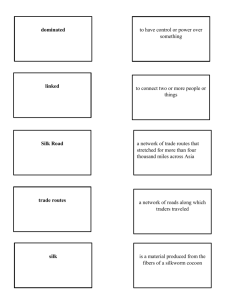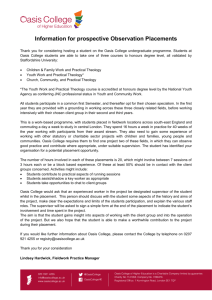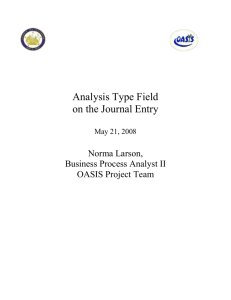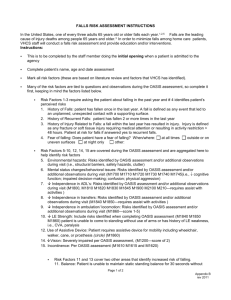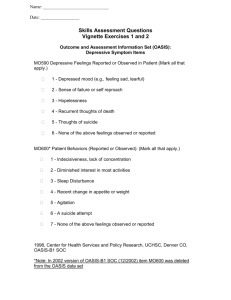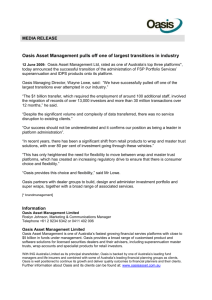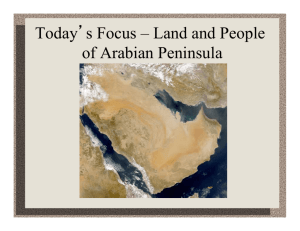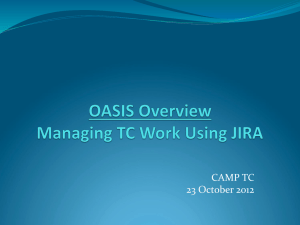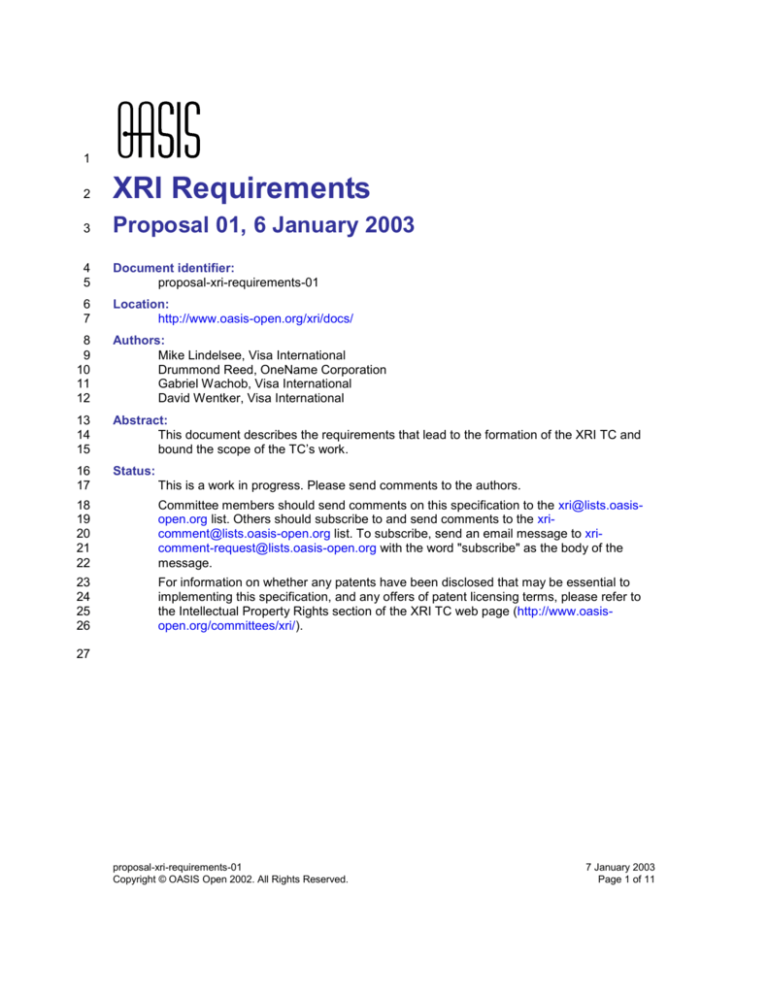
1
2
XRI Requirements
3
Proposal 01, 6 January 2003
4
5
Document identifier:
proposal-xri-requirements-01
6
7
Location:
http://www.oasis-open.org/xri/docs/
8
9
10
11
12
Authors:
Mike Lindelsee, Visa International
Drummond Reed, OneName Corporation
Gabriel Wachob, Visa International
David Wentker, Visa International
13
14
15
Abstract:
This document describes the requirements that lead to the formation of the XRI TC and
bound the scope of the TC’s work.
16
17
Status:
This is a work in progress. Please send comments to the authors.
18
19
20
21
22
Committee members should send comments on this specification to the xri@lists.oasisopen.org list. Others should subscribe to and send comments to the xricomment@lists.oasis-open.org list. To subscribe, send an email message to xricomment-request@lists.oasis-open.org with the word "subscribe" as the body of the
message.
23
24
25
26
For information on whether any patents have been disclosed that may be essential to
implementing this specification, and any offers of patent licensing terms, please refer to
the Intellectual Property Rights section of the XRI TC web page (http://www.oasisopen.org/committees/xri/).
27
proposal-xri-requirements-01
Copyright © OASIS Open 2002. All Rights Reserved.
7 January 2003
Page 1 of 11
28
29
30
31
32
33
34
35
36
37
38
39
40
41
Table of Contents
1
2
3
Introduction ............................................................................................................................. 3
Definitions ............................................................................................................................... 4
Requirements .......................................................................................................................... 5
3.1 Applications ........................................................................................................................... 5
3.2 Identifiers ............................................................................................................................... 6
3.3 Data Exchange and Data Protection ..................................................................................... 6
3.4 Federation and Delegation .................................................................................................... 7
3.5 Resolution ............................................................................................................................. 7
3.6 Specification .......................................................................................................................... 7
4
References .............................................................................................................................. 8
Appendix A. Acknowledgments ....................................................................................................... 9
Appendix B. Revision History .......................................................................................................... 9
Appendix C. Notices ...................................................................................................................... 11
42
proposal-xri-requirements-01
Copyright © OASIS Open 2002. All Rights Reserved.
7 January 2003
Page 2 of 11
43
1 Introduction
44
45
46
In defining the XRI charter a number of important requirements have been gathered. These
requirements are laid out in this document to help others understand the motivations behind the
XRI TC and to define the scope of the TC’s work.
47
48
49
50
51
52
53
While no one seems to be able to agree on exactly what digital identity is, it is clear that there is
one architectural challenge common to all digital identity proposals: establishing an open
standards-based infrastructure to enable the identification of resources—including people,
organizations, applications, devices, and digital objects—and the sharing of data associated with
these resources across domains, enterprises, and applications. Of the digital identity and data
sharing standards efforts currently underway, none have yet resulted in an open, cross-domain,
cross-application, type-neutral identification scheme.
54
55
56
57
58
59
60
61
62
Some of these efforts emphasize particular data types, applications, or requirements. For
example, SAML is concerned primarily with authentication and authorization assertions and
currently doesn’t specify a way of identifying the parties involved in these assertions other than
using URIs. The Liberty Alliance is concerned primarily with user identity and its application in
Simplified-Sign-On and e-commerce. The IETF URN specifications and implementations such as
Handle and DOI are focused on the need for identifier persistence. Other identification schemes
have been in existence since the beginning of the Web but have ties to specific protocols, data
models or hierarchical tree structures. Examples include the HTTP URL scheme, DNS, and
X.500.
63
64
65
The XRI TC is thus chartered to specify a domain-, application-, and transport-neutral
identification scheme and accompanying data exchange specifications to support distributed
directory and data exchange infrastructure. Specifically, it intends to deliver the following items:
66
67
68
A URI scheme and a URN namespace specification for resources (a resource being
anything represented on a network, including people, organizations, machines,
applications, data, and concepts).
69
70
A basic set of data exchange primitives based on XRIs and an architecture upon which
more complex data exchange scenarios can be built.
71
A schema for associating metadata with the resource identified by an XRI.
72
73
proposal-xri-requirements-01
Copyright © OASIS Open 2002. All Rights Reserved.
7 January 2003
Page 3 of 11
74
2 Definitions
75
76
Attribute – data associated with a resource. An attribute in the context of one resource may be a
resource itself in another context.
77
78
Authority – A resource representing a resource controller responsible for making assertions about
the identity or attributes of another resource.
79
80
Delegation – The act of a resource controller granting control of a resource to another resource
controller.
81
82
83
84
Digital Identity – A representation of a resource on a network. This term is most often used to
refer to the digital representation of a resource that has a separate real-world identity, such as a
person or organization. A resource that lives only on the network, such as a digitial file, is typically
referred to simply as a resource.
85
86
87
88
89
90
Domain – A logical concept in networking meaning a zone of control, administration, authority,
trust, or policy enforcement. For example, a “trust domain” is a zone (a network, or collection of
machines, or other logical partition) where all entities have a certain level of trust not afforded
outside that zone. A "host domain" is a zone where all the resources are physically hosted and
administered together. A "legal domain" is a zone where all the resources are under the control of
the same resource controller.
91
92
Federation – An architecture which allows resource controllers to delegate authority to other
resource controllers for purposes of registering and resolving identifiers.
93
Identifier – A data object used to uniquely address a resource.
94
95
Resource – An entity represented on a network. Resources can include people, organizations,
machines, applications, data, and concepts.
96
97
Resource Controller – the person or organization responsible for the definition and attributes of a
resource. A resource representing a resource controller is often referred to as a digitial identity.
98
Version – a state of a resource or an attribute that can be identified apart from other states.
proposal-xri-requirements-01
Copyright © OASIS Open 2002. All Rights Reserved.
7 January 2003
Page 4 of 11
99
100
101
102
3 Requirements
Various identifier schemes have been created for identifying resources, but for a variety of
reasons, they do not meet the requirements for a general purpose, extensible identification
scheme. These existing schemes are:
103
Tied to a particular application (e.g. email addresses).
104
Tied to a particular data type (e.g. users/user identity)
105
106
Tied to a particular transport scheme and thus imply an infrastructure which may not
always be desired (e.g. HTTP URLs).
107
108
Tied to a particular data or representation type (e.g. LDAP OIDs) and thus are limited in
scope or use.
109
110
111
112
113
114
115
Once an abstract, application-independent scheme exists for identifying a resource and its
associated data, it invites an abstract, application-independent mechanism for exchanging this
data. To meet this need, the XRI TC will define a very basic set of data exchange primitives,
based on the REST architecture that uses a small set of “verbs” (operations) and a large set of
“nouns” (e.g. identifiers of resources). This architecture is closely modeled after the original intent
of the WWW, and seeks to extend the success of the WWW to more general inter-application
communication over the Internet.
116
117
118
119
Following the promise of the REST architecture, more complex interactions can be built from this
basic data exchange architecture. These interactions can be as rich as the most complex b2b
scenarios, as shown by the ability of the WWW to support a wide variety of e-commerce
scenarios with only the most basic of operations.
120
121
A third requirement of application-independent data exchange is a standard mechanism for
associating metadata with a resource and its data. Such a mechanism can:
122
123
Standardize basic metadata about the data (e.g., timestamps, version numbers,
namespaces, encodings, etc.)
124
Control data exchange via the protocol described above
125
126
127
Create and maintain links between associated pieces of data, including federating data
across physical locations. This allows collections of physical data to be recognized as a
single logical “digital identity.”
128
3.1 Applications
129
The XRI specifications:
130
131
1. Should support identifying any type of resource (parties, devices, applications, data,
concepts) in inter-domain transactions of any type.
132
2. Should support cross-domain web services message routing.
133
3. Should support inter-directory and metadirectory data exchange.
134
4. Should support “digital identity” applications of any type.
135
136
5. Must support association of arbitrary data with identified resources (i.e., enable
identification of attributes of the resource).
137
138
6. Should be able to be deployed privately within a community of interest, and later
federated with other communities.
139
proposal-xri-requirements-01
Copyright © OASIS Open 2002. All Rights Reserved.
7 January 2003
Page 5 of 11
140
3.2 Identifiers
141
The XRI scheme:
142
1. Must conform to the URI specification (RFC 2396).
143
144
2. Must support the use of identifiers based on other URI schemes (by syntactic
encapsulation).
145
3. Must not be tied to a particular network transport.
146
4. Must require no central root (but can support one).
147
148
149
5. Must support permanent identifiers (identifiers that do not change when attributes of the
resource they identify change, and which are not reassigned to another resource if the
resource they are originally assigned to is removed from the network).
150
6. Must support human-friendly identifiers (readable, memorable, expressable).
151
152
7. Must support machine-friendly identifiers (efficient delegation, federation, resolution, and
caching).
153
154
8. Must support location-independent identifiers (identifiers that identify the same logical
resource in different physical locations on the network).
155
156
9. Must support cross-referenceable identifiers (identifiers that identify the same logical
resource in the context of different parent resources).
157
10. Must support identification of attributes of a resource.
158
11. Must support identification of different versions of a resource or its attributes.
159
12. Must not require use of personally identifiable information.
160
13. Should support URI-based technologies (e.g., semantic web and topic maps).
161
162
14. Must allow identification of resources with no network-accessible representation (i.e.,
without any data representation on the network).
163
164
The XRID namespace:
165
1. Must conform to the URN specification (RFC 2141).
166
2. Must be capable of being encapsulated in the XRI scheme.
167
168
3.3 Data Exchange and Data Protection
169
Data exchange based on the XRI specifications:
170
171
1. Should allow for exchange of XRI-identified resources and attributes between directories
and other databases.
172
2. Must support control of the security associated with the data exchange channel.
173
3. Must support common security frameworks (e.g., SAML, WS-Security, etc.)
174
175
4. Should be extensible to other controls on data exchange including synchronization,
usage directives, retention policies, and other permissions.
176
5.
[need to enumerate list of other “expected” data protection features/requirements]
177
proposal-xri-requirements-01
Copyright © OASIS Open 2002. All Rights Reserved.
7 January 2003
Page 6 of 11
178
3.4 Federation and Delegation
179
The XRI specifications:
180
181
1. Must support the federation of namespaces between authorities (i.e., using an identifier
that is managed elsewhere).
182
183
2. Must enable resources or attributes physically hosted across multiple domains to be
linked to form a single logical resource.
184
185
3.5 Resolution
186
Resolution of an XRI identifier:
187
1. Must not require a centralized root directory.
188
2. Must support completely decentralized resolution.
189
3. Must support completely centralized resolution.
190
4. Must not require DNS (though it may use it).
191
192
5. Must support trusted resolution, i.e., a level of certainty or trust that an identifier is
resolved to the resource to which an authority assigned it.
193
194
3.6 Specifications
195
The XRI specifications:
196
1. Must be royalty-free.
197
2. Must be language- and application-independent.
198
199
200
3. Must leverage and integrate with other specifications from IETF, W3C and OASIS –
particularly XML specifications, web services specifications (SOAP, WSDL, et al) and
XML and web service security specifications (SAML, WS-Security, et al).
201
4. Should be easy to implement, requiring minimal new technology investment.
202
proposal-xri-requirements-01
Copyright © OASIS Open 2002. All Rights Reserved.
7 January 2003
Page 7 of 11
203
4 References
204
205
Tim Berners-Lee, et. al, "Uniform Resource Identifiers (URI) Syntax", RFC 2396, August
1998.
206
R. Moats, "URN Syntax", RFC 2141, AT&T, May 1997.
207
proposal-xri-requirements-01
Copyright © OASIS Open 2002. All Rights Reserved.
7 January 2003
Page 8 of 11
208
Appendix A. Acknowledgments
209
210
The following individuals were members of the committee during the development of this
requirements document:
211
Geoffrey Strongin, AMD
212
Krishna Sankar, Cisco
213
Joseph Moeller, EDS
214
Jim Schreckengast, Gemplus
215
Xavier Serret, Gemplus
216
Phillipe LeBlanc, Gemplus
217
Winston Bumpus, Novell
218
Nat Sakimura, NRI Pacific
219
Hiro Ogawa, NRI Pacific
220
Tomonori Seki, NRI Pacific
221
Tetsu Watanabe, NRI Pacific
222
Drummond Reed, OneName
223
Loren West, OneName
224
Dave McAlpin, OneName
225
Marc LeMaitre, OneName
226
Dave Wentker, Visa International
227
Rajeev Maria, Visa International
228
Mike Lindelsee, Visa International
229
Gabe Wachob, Visa International
230
Michael Willett, Wave Systems
231
Lark Allen, Wave Systems
232
Bill Washburn, XNSORG
233
Eamonn Neylon, Manifest Solutions
234
Reva Modi, Infosys
235
Peter Davis, Neustar
236
Thomas Bikeev, EAN International
237
James Bryce Clark, Individual Member
238
Matthey Dovey, Individual Member
239
In addition, the following people made contributions to this specification:
240
241
Revision History
Rev
Date
By Whom
What
proposal-01
2003-01-6
Mike Lindelsee,
Initial version
proposal-xri-requirements-01
Copyright © OASIS Open 2002. All Rights Reserved.
7 January 2003
Page 9 of 11
Rev
Date
By Whom
What
Drummond Reed,
Gabriel Wachob,
David Wentker
242
proposal-xri-requirements-01
Copyright © OASIS Open 2002. All Rights Reserved.
7 January 2003
Page 10 of 11
243
Appendix B. Notices
244
245
246
247
248
249
250
251
252
OASIS takes no position regarding the validity or scope of any intellectual property or other rights
that might be claimed to pertain to the implementation or use of the technology described in this
document or the extent to which any license under such rights might or might not be available;
neither does it represent that it has made any effort to identify any such rights. Information on
OASIS's procedures with respect to rights in OASIS specifications can be found at the OASIS
website. Copies of claims of rights made available for publication and any assurances of licenses
to be made available, or the result of an attempt made to obtain a general license or permission
for the use of such proprietary rights by implementors or users of this specification, can be
obtained from the OASIS Executive Director.
253
254
255
OASIS invites any interested party to bring to its attention any copyrights, patents or patent
applications, or other proprietary rights which may cover technology that may be required to
implement this specification. Please address the information to the OASIS Executive Director.
256
Copyright © OASIS Open 2002. All Rights Reserved.
257
258
259
260
261
262
263
264
265
This document and translations of it may be copied and furnished to others, and derivative works
that comment on or otherwise explain it or assist in its implementation may be prepared, copied,
published and distributed, in whole or in part, without restriction of any kind, provided that the
above copyright notice and this paragraph are included on all such copies and derivative works.
However, this document itself does not be modified in any way, such as by removing the
copyright notice or references to OASIS, except as needed for the purpose of developing OASIS
specifications, in which case the procedures for copyrights defined in the OASIS Intellectual
Property Rights document must be followed, or as required to translate it into languages other
than English.
266
267
The limited permissions granted above are perpetual and will not be revoked by OASIS or its
successors or assigns.
268
269
270
271
272
This document and the information contained herein is provided on an “AS IS” basis and OASIS
DISCLAIMS ALL WARRANTIES, EXPRESS OR IMPLIED, INCLUDING BUT NOT LIMITED TO
ANY WARRANTY THAT THE USE OF THE INFORMATION HEREIN WILL NOT INFRINGE
ANY RIGHTS OR ANY IMPLIED WARRANTIES OF MERCHANTABILITY OR FITNESS FOR A
PARTICULAR PURPOSE.
proposal-xri-requirements-01
Copyright © OASIS Open 2002. All Rights Reserved.
7 January 2003
Page 11 of 11

